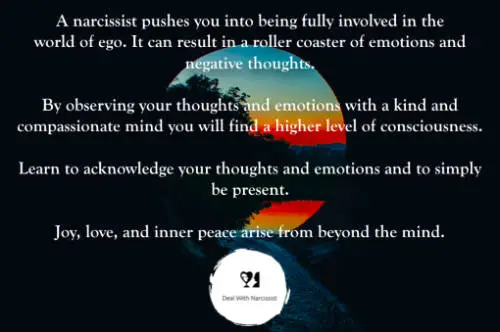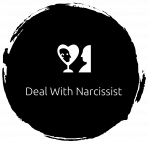In this article, I will explore practicing mindfulness after narcissistic abuse or when still dealing with narcissists. Can mindfulness or ‘awareness’ be helpful to push your mind in a healthier direction? I certainly believe so and I will try to explain how and why it can help!
When you’re dealing with a narcissist your energy is being drained and it can feel like you become (more) disconnected from yourself. This means you could be less aware of what’s really going on and spend most time being involved in your mind, which is being involved in your thoughts and emotions. You might feel confused a lot or feel like you can’t think clearly.
A narcissist (ab)uses the mind of a victim and that mind could become full of fear, anxiety, negative thoughts, shame, and self-doubt. By manipulation and fully being involved in the world of ego, narcissists push your mind in the wrong direction and emphasize your fears, negative thoughts and/or doubts.
It’s very brutal how narcissistic abuse works and the impact a narcissist can have on you and your mind. A narcissist uses all kinds of devaluing manipulative behaviour such as gaslighting, triangulation, silent treatments and this can lead to very unhealthy dynamics in a relationship, which could be a romantic relationship but familial as well.
This article is focused on shifting attention to yourself again. I will now go into the mind and how mindfulness can be helpful in order to create a more kind and compassionate mind.
An unhealthy mind
I grew up having a narcissistic father, which motivated me to create this website in order to possibly help others experiencing narcissists. My mind was in a very unhealthy state when I moved out of the family home. All my fears and self-doubts were emphasized during the years and I was very ‘involved’ in my thoughts. My thoughts were controlling me and these thoughts were mostly negative and judgmental.
Trying to find a way in ‘adult’ life I became very interested in psychology, the mind, and Eastern thinking. I soon realized how negative, judgmental, and unsupportive my inner voice was. By becoming more aware of my thinking instead of identifying with it, I learned how to better use my mind instead of my mind using me. This process helped me to slowly acknowledge what’s going on in my mind and to develop my self-worth.
Clearly, I’m still learning and changing your thought patterns and emotions isn’t an instant change. It’s hard work. You can’t change the destination immediately but you can change the direction in which you’re going instantly!
Consciousness within yourself
I believe it’s very important to create a form of consciousness or awareness within yourself. When you start to watch or observe your thoughts and emotions, you become more aware of what’s going on inside your mind. To be clear, this doesn’t mean there are no thoughts or emotions anymore. You simply become a conscious presence.
It means you still can have negative or judgmental thoughts, which isn’t a problem. You don’t need to force anything. It’s simply about being present and observing without judgment or expectation. The difference between being aware and not being aware when, for example, judging yourself (your inner critic) is important.
To create this difference in awareness or consciousness is where I think mindfulness, conscious breathing, and/or meditation can be very helpful to those dealing with narcissists.
Identification with your mind: you are not your mind
Do you control your thinking or does your thinking control you? You have a mind, you have thoughts and emotions, and the question is how do you perceive these thoughts and emotions? Are you able to stop thinking from time to time?
Mindfulness is about the inner stillness that is one with your ‘being’. This stillness is simply what remains when there is no mental noise. By practicing mindfulness, you start a process of reducing mental noise and over-thinking.
The basic error when it comes to thinking is when you perceive your thinking as being equal to who you are and your identity. It results in living in a state of separateness. ‘Enlightenment’ is seeing through the illusion of this separateness and is a state of wholeness. It’s knowing your true self of harmony, love, and peace.
If there is separation by identifying with the mind, there will be conflict, problems, suffering, and compulsive thinking. The mind will create words, concepts, labels, images, expectations, judgments, and so forth. This will not allow for true relationships, including the relationship with yourself. The illusion of separateness stands in the way of knowing you are one with all that is.
Reading the above, you might think ”Well, I’m not seeking ‘enlightenment’ or ‘wholeness’!”. This isn’t necessary to practice mindfulness, as it’s something practical and is about aiming to be more present in the here and now. In more simple terms: mindfulness is about acknowledging your thoughts and emotions and trying to be more aware or conscious.
Thinking and internal dialogues
I like the following reasoning from Alan Watts: ‘A person who thinks all the time has nothing to think about except thoughts, so he loses touch with reality, and lives in a world of illusions.’
This describes the unending internal dialogues, calculations, or compulsive thinking a person can have. I know I’ve had my fair share of unhealthy internal dialogues.
A lot of thinking is repetitive, useless, and most importantly negative. Simply try to observe your mind and find out whether your thoughts are kind and compassionate or negative and harmful. What’s the tone your thoughts use towards yourself?
Clearly, thinking itself is not a bad thing. The mind is a powerful tool. It can be used to solve problems. We do, however, need to able to put it away when we don’t need the mind though. You should use your mind instead of the mind using you. To summarize: you are not your mind!
You are not the thinker
An important realization thus is that you are not the thinker. This realization enables you to start observing the thinker. When you listen to a thought, you are aware of the thought but also aware of yourself listening to the thought. Observing the thinker allows for a higher level of consciousness. You will start to realize love, creativity, joy, and inner peace arise from beyond the mind.
When you feel a conscious presence listening to your thought, the thought itself will lose power over you and will float by. By observing the thinker you thus no longer energize the mind by identifying with your thoughts. There will start to come moments of ‘no thought’ or ‘no-mind’. These are gaps between your thoughts.
In these gaps, there is stillness and peace within you. It’s a place of conscious presence.
When you focus your attention on the here and now, by for example meditating, you create the same gaps in the mind. It’s consciousness of the present moment. When you try to become aware of being present in the here and now, you will notice how much we mostly aren’t present. This awareness is great!
Mindfulness is thus not about controlling your thoughts. It’s acknowledging your thoughts and emotions, being present, and deciding which thoughts are helpful, more positive, or truthful. In a way, you retrain your mind in the opposite direction of which a narcissist pushes your mind.
A narcissist affects your mind negatively
Everyone hears a voice in their head. This can be challenging enough even without dealing with a narcissist.
Sadly, narcissists cause/emphasize a lot of negative thoughts and feelings, about which you can read more in this article. When you experience a narcissist or have experienced a narcissist, you might have an inner voice that is not that kind or compassionate to yourself.
A narcissist thus creates and emphasizes negative thoughts and feelings within a victim. This can result in a roller coaster of emotions and feeling anxious, fearful, tense, stressed, depressed, full of self-doubt, and so forth. You are likely to seek answers within yourself, even for problems or behaviour that are not your own. Your mind could become trained in blaming yourself and being full of doubt.
A narcissist is great at pushing their victim to become very unaware and feeling ‘empty’. For example, the brutal manipulation method called gaslighting pushes a victim to (slowly) disconnect from themselves. It can make someone stuck in their head because of the constant manipulation and the abuse results in cognitive dissonance.
The mind will try to fight or remove emotional pain. As the mind is part of the problem, it will not succeed to solve it. In this unhealthy state caused by narcissistic abuse, the thinking and emotion might stimulate/feed each other into a downward spiral. Negative thought patterns such as seeking answers within yourself and blaming yourself lead to negative emotions which will energize more negative thoughts, and so forth.
I recommend reading my in-depth article about cognitive dissonance to learn more about how the mind works and how narcissists (ab)use your mind.
Ego and the here and now
When identifying with the mind, you derive a sense of self from the activity within your mind. If you stop thinking, would you still be you? Your ego will try to convince you that you wouldn’t be yourself without all this thinking. It will create a mental image of who you are.
The ego is all about the past and the future. It requires the past to be alive, because who would you be without the past? The future is important as well, as the ego seeks fulfillment in the future. To survive, the ego needs you to be in the past or the future. As long as you are your mind, the ego is thriving.
Consciousness doesn’t require thoughts but ego does. Ego loves comparing, complaining, liking, speculating, judging, commenting, and so forth. We all know many of these things aren’t that relevant to the situation at that moment. You can be quite busy with reviving some past events or think about what future situations might bring. When you do this, you will not be present in the here and now.
Your inner voice might imagine things going wrong and having negative outcomes, which is worry. A lot of this thinking drains your energy. It takes away the now. This is a funny thing because you can only be in the here and now. Mindfulness will naturally reduce the dominance of ego.
You can learn more about ego from an Eastern perspective in my article exploring Taoism and narcissism.
Emotions as a reflection of your mind
Emotions are a reflection of your mind within your body. The more you’re identifying with your thinking, the less present you will be. Try to focus your attention on the inner energy of your body. What is going on inside you at this moment?
Feeling your body from within will help you to be more in touch with your emotions. When there seems to be a conflict between your thoughts and the emotion you feel in your body, your emotion will be the truest reflection of your mind.
You can try to observe your emotions with the same awareness you can observe thoughts. You aren’t your emotion. Allow the emotion to be there without trying to control it and be there as an observing presence.
‘Shine the warm light of awareness on your thoughts and feelings’, says Thich Nhat Hanh. It results in having a form of control over your situation. You are gentle and kind to yourself.
Questions you ask yourself
So how do we think? A lot of thinking is in the form of questions you ask yourself. The interesting thing is that the mind will provide answers to these questions, whether the questions are conscious or unconscious. If you question yourself about what you did wrong or why you’re not worthy, your mind will try to find an answer to that.
Your answers will thus depend on the quality of the questions you ask. The disturbing thing is that narcissists push you towards asking low-quality questions to yourself.
Think about what happens if you start asking more questions such as:
- Am I responsible for the behaviour of others?
- Do I want to cross my boundaries in order to fulfill the needs of another person or shouldn’t they (indirectly) ask me to do that?
- Is it healthy behaviour to, for example, use blaming or silent treatment in order to communicate and am I the one that should change my behaviour?
- Should I be treated with respect and be seen as an individual with my own needs and feelings?
- Do I consciously choose to do this or am I doing it for someone else, and why do I feel that way?
- What does my intuition tell me?
- How can I be more aware today?
If you start asking better questions, you will get better answers. The mind simply follows your lead. Therefore, in my opinion, the realization that you can set a direction is very important.
Obviously, it takes time to reach a different destination but it always starts by setting the direction in the right way. As mentioned before, changing your direction can be done right away and the destination will follow. Know you have the power to change your direction and to shift the attention to yourself instead of the narcissist.
By being more aware of thoughts and emotions, you will be more aware of the questions you ask yourself. To start, you could help your mind by writing down better quality questions and start asking them to yourself daily.
To conclude
Mindfulness is thus about freeing yourself from your mind, which is a process you can start now. Observe the voice in your head and be present. Do not judge what you hear but simply be present.
It’s important to learn to disidentify from your mind. By practicing mindfulness and meditation you can (slowly) create more consciousness and create gaps between your thoughts. It will reduce the amount of mental noise in your mind and help to think more clearly.
By practicing observing feelings and emotions, you try to shine the light of consciousness on your mind. You can find a way that suits you, which could be meditation, yoga, or conscious breathing. I think it’s worth a try!
When practicing, know it’s important to take your time and to be compassionate to yourself when learning. I recommend starting with small steps and meditate or do breathing exercises a few minutes a day. It’s better to create a small daily habit of a few minutes than trying to go all-in right away. Long term change is more likely to be accomplished by using these small daily steps.
You can read more about mindfulness in my article about conscious breathing, which includes breathing exercises. I also wrote an article exploring Buddhism and narcissism and an article with some tips in Buddhist meditation you might be interested in.
I’m curious about your experience and would love to read it in the comments below! I sincerely hope this article can be helpful to you in some way.
You deserve your own kindness and compassion!

– Did you like this article and is it helpful to you? I encourage you to share, like, follow, comment, and possibly subscribe to my newsletter to receive monthly updates of my activities!


Thank you fo all the info! It is enlightening and calms me when I hyperventilate from fear of how my hubby will give me the silent treatment